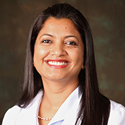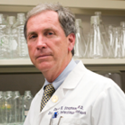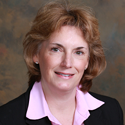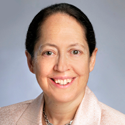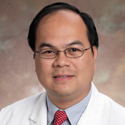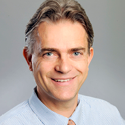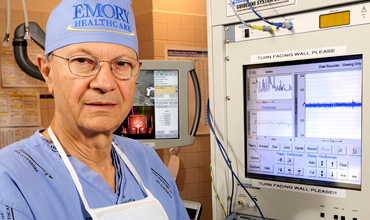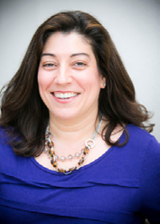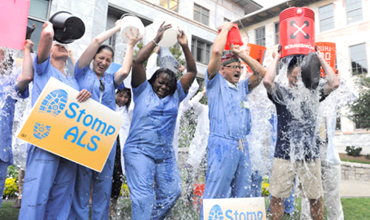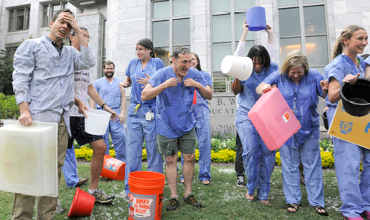If this message displays incorrectly, please view the web page
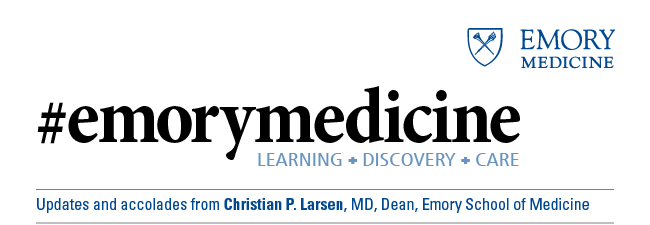
| September 30, 2014 | |||||||
| NOTEWORTHY
'Addicted Brain' course popular on MOOC
Kudos to Michael Kuhar (neuropharmacology), who organized a MOOC (massive, open, online course), “The Addicted Brain,” a free, seven-week internet class that started June 23. The class presented an overview of addiction, focusing mainly on drug addiction, but including addiction to the internet, gambling, and other behaviors, with a focus on brain changes in the disease; 45,000 people registered from about 200 countries. NOTABLES Deborah Baumgarten (radiology) was elected President of the Society of Abdominal Radiology. Jesse Jacob (infectious diseases) is chair-elect of the Healthcare Epidemiology Division of the American Society for Microbiology.
Susmita Parashar (cardiology) was elected Fellow of both the American Heart Association and the American College of Cardiology.
David Stephens, Stephen W. Schwarzmann Distinguished Professor and Chair of Medicine, was elected Fellow of the American Academy of Microbiology.
Jana Stockwell (pediatrics) was appointed Editor-in-Chief for PREP ICU National Publication.
Barbara Stoll, George W. Brumley, Jr. Professor and Chair of Pediatrics, was elected to the University Senate.
Vin Tangpricha (endocrinology), was elected to the Board of Directors for the American Association for Clinical Endocrinologists.
Erwin Van Meir (neurosurgery) was elected as judge for the Brain Startup Challenge, The Center for Advancing Innovation. EVENTS Oct. 2-3: HIV & Aging: From Mitochondria to the Metropolis. Decatur Marriott, Atlanta. More info. Oct. 29: Emory Medicine 2015. Address by Dean Christian Larsen, 4:30, WHSCAB Auditorium. Reception to follow. Oct 31: 2014 EHC Quality Conference. 8-noon, Cox Hall. More info. |
|
Extraordinary efforts
Every once in a while, when you work at a major academic medical center, you get to be a part of something truly historic. That happened here this summer when medical missionary Dr. Kent Brantly was admitted to Emory University Hospital. The fact that Emory Hospital was chosen to care for the first Ebola patient in the US was not by chance: the Serious Communicable Disease Unit was established 12 years ago, in partnership with the CDC, and our infectious disease team, under the leadership of Bruce Ribner, was well prepared for such a scenario. A few days later, a second patient, Nancy Writebol, arrived. And, as you know, we are now caring for a third patient in the unit—also an American aid worker infected in Africa. I know that, throughout the summer, we have all been called upon to be educators as we received comments and questions from understandably anxious friends, neighbors, and family members. We knew we could improve the likelihood of a positive outcome for these patients and that we could do so safely, in a manner that would protect ourselves and others. In fact, our unit's team is trained to handle pathogens much more contagious than Ebola. We can be proud of the high-level, meticulous care that the Ebola team provided and continues to provide. We are rapidly putting into use what we have learned from our experience with these patients and sharing this information with colleagues worldwide. The front lines of this battle remain in West Africa, and it is our duty and privilege to assist health care workers there in any way we are able. In that spirit, several members of the Ebola care team were able to meet with President Obama and talk with him about strategies for combatting Ebola and caring for patients with the virus during his visit to the CDC on Sept. 16. The President thanked Emory's health care team members for their "extraordinary efforts."
DeLong receives a Lasker
Convinced that "the brain held the most interesting problems," Mahlon DeLong spent years immersed in the mysteries of the basal ganglia, first at the National Institute of Mental Health, next at Johns Hopkins, and then at Emory for 24 years. For his part in elucidating that region's function and its relationship to movement disorders like Parkinson's, DeLong received the 2014 Lasker-DeBakey Clinical Medical Research Award, which he shared with French researcher Alim Louis Benabid. The Lasker Awards are among the most respected science prizes in the world, honoring visionaries whose insight and perseverance have led to dramatic advances that will prevent disease, reduce disability, and diminish suffering. This year's ceremony took place Sept. 19 in New York City. DeLong and Benabid were honored for their roles in developing deep brain stimulation of the subthalamic nucleus, a surgical technique that reduces tremor and restores motor function in patients with advanced Parkinson's disease. Their work has resulted in an effective treatment for more than 100,000 people worldwide, and led to a renaissance in surgical approaches for treating neurologic and psychiatric disorders. We join numerous other scientists, physicians, and patients who have benefited from his work in our gratitude to Dr. DeLong and our admiration for his scientific insights, his creative genius, and his perseverance in helping resolve one of the most devastating diseases of our time. Houry named director of CDC center
Congratulations to Debra Houry, who will become director of the National Center for Injury Prevention and Control at the CDC on Oct. 6. Houry holds joint appointments in emergency medicine and in public health (behavioral sciences and health education, and environmental health) and is an attending physician at Emory University Hospital and Grady, as well as director of the Emory Center for Injury Control. “I’m excited for this opportunity to work with an amazing team in the CDC to impact injuries and violence on a national level and to translate what I see in the emergency department into areas for prevention,” she says. “I’m grateful for all the mentorship and support I've had at Emory and look forward to continued collaborations.” At CDC’s injury center, Houry will lead a staff of more than 250 charged with protecting Americans from non-occupational injuries, including prescription drug overdoses, motor vehicle-related injuries, traumatic brain injuries, and violence against child and youth. SOM takes the Ice Bucket Challenge
|


